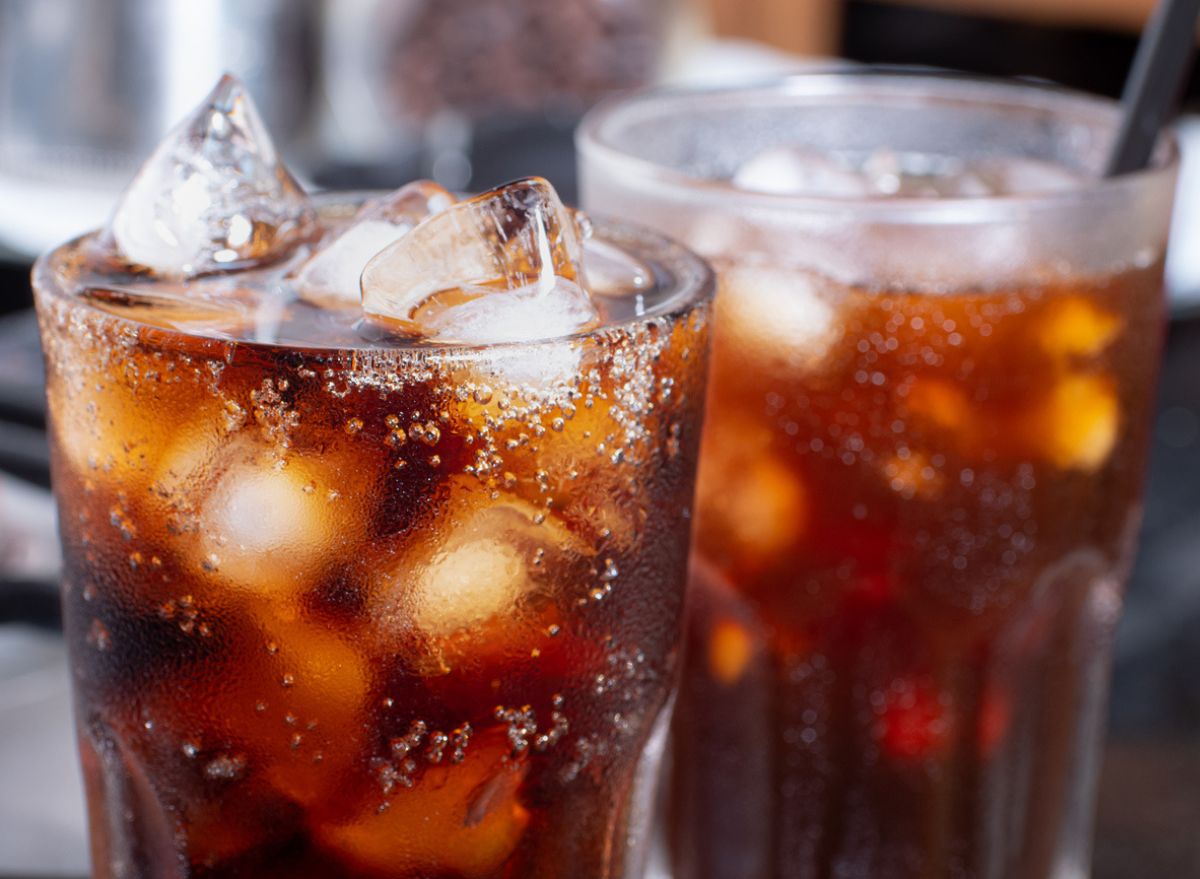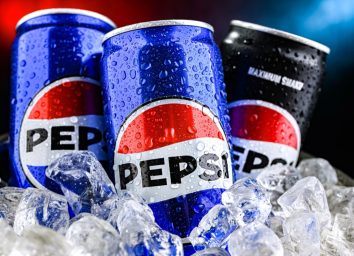What Happens to Your Body When You Drink Soda Every Day

It shouldn't be a surprise to find out that it's best to limit the amount of soda you drink on a regular basis. It's hard to imagine anyone thinking that it might be beneficial to their health, and most people surely know that the answer to "Is soda bad for you" is "Yes." Despite this, 63% of adults in the United States say that they consume at least one sugar-sweetened beverage each and every day, according to the Centers for Disease Control and Prevention (CDC).
That means there's a very good chance you or someone close to you is among this group. However, that might change when you find out what these sugar- and calorie-packed drinks are actually doing to your body if you consume them every day.
"Soda poses multiple health risks due to its composition," Kelsey Costa, MS, RD, US-based registered dietitian and health research specialist working with the National Coalition on Healthcare, tells Eat This, Not That! "Soda is loaded with added sugar, usually in the form of high fructose corn syrup. Most 12-ounce soda cans contain 10-12 teaspoons (39-49 grams) or more of added sugar. That's approximately twice the daily recommended limit for added sugar."
"High added sugar intake is associated with numerous adverse health outcomes, ranging from increased weight and inflammation risk to mental health conditions and cancer," Costa also explains. Just consider the fact that "consuming a daily 12-ounce soda translates to an annual intake of roughly 65 pounds of added sugar solely from these beverages." That's obviously an excessive amount and a situation that you should avoid so that it doesn't negatively impact your overall health.
With that in mind, you'll surely want to find out what exactly happens to your body when you drink soda every day and why that's something you definitely don't want to do. Read on, and for more, don't miss 25 Healthy, Low-Sugar Soda Alternatives.
Weight Gain
"Drinking soda every day can lead to weight gain," says Costa while addressing this issue. "Each can of soda contains approximately 150 to 200 calories, mainly from added sugars. This can lead to a calorie surplus if not offset by physical activity, resulting in weight gain over time."
In fact, in May 2020, the International Journal of Behavioral Nutrition and Physical Activity published a study that found that physical activity that was performed during leisure time was not able to offset the weight gained by consuming soft drinks.
Increased Risk of Type 2 Diabetes
"Regular soda consumption causes repeated spikes in blood sugar and insulin levels," Costa tells us. She also explains why is this a problem and why it should concern you by noting that "over a period of time, this can result in insulin resistance, which plays a crucial role in the onset of type 2 diabetes."
Indeed, a study published by the Diabetes Care journal in August 2010 noted that people who drank sugary beverages like soda on a daily basis had a 26% increased risk of developing type 2 diabetes compared to people who rarely consumed sugar-filled drinks. A more recent study published by Diabetes Care in December 2019 found that even over a mere 4-year span, the risk of diabetes for those who consumed sugary drinks daily shot up by 16%. Both percentages are significant enough to surely make you wary of regularly consuming soda.
Bone Health Degradation
"Some research suggests that phosphoric acid, found in many sodas, may interfere with calcium absorption, potentially weakening bones and increasing the risk of fractures," says Costa. In fact, The American Journal of Clinical Nutrition published a study in September 2014 that showed that every soda that participants consumed during the day increased the risk of suffering a hip fracture by a worrisome 14%.
Dental Issues
If you want to avoid the kind of food and drinks that might lead to dental issues, then you definitely need to skip your daily soda. Costa explains that "the sugar and acid in soda can erode tooth enamel, the outermost layer of your teeth, leading to cavities and tooth decay." She adds that "this risk is higher for those who drink soda daily."
Increased Risk of Fatty Liver Disease
"The liver metabolizes sugar," says Costa while discussing another problem with drinking too much soda. "Excessive consumption of refined sugar and high-fructose corn syrup, such as in daily soda intake, can overburden the liver and result in the accumulation of extra fat, which can lead to non-alcoholic fatty liver disease."
Frankly, around 100 million people in the United States suffer from non-alcoholic fatty liver disease which is something that up to 25% of people in the U.S. deal with, according to the American Liver Foundation. You can reduce your risk of becoming one of the people in this group by avoiding excessive amounts of soda.
Heart Disease Risk
Heart disease happens to be the leading cause of death in the United States, according to the CDC. Although there are many factors that can affect the health of your heart, "drinking soda daily increases the risk of developing heart disease due to excessive sugar intake, which can lead to obesity, diabetes, and high blood pressure," Costa says.
Potential Harm to Kidneys
"Drinking soda, especially those made with high fructose corn syrup, can increase uric acid levels in the body," says Costa. "This can cause crystals to form in the kidneys, resulting in painful kidney stones."
On top of that, Costa explains that it's "the high fructose corn syrup in soda that can increase uric acid levels in the body, which may cause gout and kidney stones." She notes that "gout is a painful condition where uric acid crystals accumulate in your joints," whereas "kidney stones, on the other hand, are hard deposits made of minerals and salts that form inside your kidneys and can be extremely painful to pass."
That's certainly enough of a reason to limit how much soda you're consuming on a regular basis. However, beyond that, Costa tells us that "consistent soda consumption may also increase the risk of developing chronic kidney diseases," which is unfortunate but, in this case, it's fortunately avoidable. Simply cut back on soda to protect your kidneys and the rest of your body, which will surely appreciate it.
- Source: https://www.cdc.gov/nutrition/data-statistics/sugar-sweetened-beverages-intake.html
- Source: https://ijbnpa.biomedcentral.com/articles/10.1186/s12966-020-00963-2
- Source: https://diabetesjournals.org/care/article/33/11/2477/26589/Sugar-Sweetened-Beverages-and-Risk-of-Metabolic
- Source: https://pubmed.ncbi.nlm.nih.gov/31582428/
- Source: https://ajcn.nutrition.org/article/S0002-9165(23)04763-9/fulltext
- Source: https://liverfoundation.org/liver-diseases/fatty-liver-disease/nonalcoholic-fatty-liver-disease-nafld/
- Source: https://www.cdc.gov/nchs/fastats/leading-causes-of-death.htm







